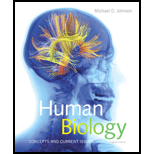
If you might be a carrier of a gene for an unpreventable condition, would you want to know? Why or why not?
To review:
The benefits of gene testing for knowing about the presence of a defected gene.
Introduction:
In genetics, a carrier is an individual, which has a recessive gene of a trait. These traits are not expressed in them as they are masked by the dominant allele of that particular trait. These recessive traits are inheritable, which can be transferred from one generation to another.
Explanation of Solution
It is necessary to know the genes that a person carries if those genes can cause an unpreventable condition. This is because these genes are inherited. This condition may not exist in the carrier, but there are chances that these traits express themselves in the next generation. This might happen when the carrier mates with a person actually having that disorder. It increases the chances of having an abnormal child.
Mostly, females are the carrier for a disease or disorder and the males express that particular disease when they also carry recessive alleles for that particular disease. This is because females have two pairs of homologous chromosomes, which means females have two X chromosomes. The disease will not be expressed in a female if the defected gene is present on one X chromosome. The second X chromosome masks the expression of the recessive allele.
When the affected gene is transferred to the male of the next generation, the disease will express itself. This is because males are hemizygous, that is they have X and Y chromosomes. The single X chromosome is acquired from the mother.
Thus, if a person knows about any defected genes present in them, they can avoid the transmission of this gene by marrying a person with dominant genes. In case the couple is already married, they can also decide to avoid conceiving any children or terminate the pregnancy. The couple can also get sufficient time to adapt emotionally if the pregnancy cannot be terminated.
Thus, it is necessary to know about the genes one carry if they can cause unpreventable conditions. This is because these genes will express in the next generation. Knowing about such genes gives a chance to plan for children and also in choosing suitable partners.
Want to see more full solutions like this?
Chapter 19 Solutions
Human Biology: Concepts and Current Issues (8th Edition)
- Describe three cranial and postcranial features of Neanderthals skeletons that are likely adaptation to the cold climates of Upper Pleistocene Europe and explain how they are adaptations to a cold climate.arrow_forwardBiology Questionarrow_forward✓ Details Draw a protein that is embedded in a membrane (a transmembrane protein), label the lipid bilayer and the protein. Identify the areas of the lipid bilayer that are hydrophobic and hydrophilic. Draw a membrane with two transporters: a proton pump transporter that uses ATP to generate a proton gradient, and a second transporter that moves glucose by secondary active transport (cartoon-like is ok). It will be important to show protons moving in the correct direction, and that the transporter that is powered by secondary active transport is logically related to the proton pump.arrow_forward
- drawing chemical structure of ATP. please draw in and label whats asked. Thank you.arrow_forwardOutline the negative feedback loop that allows us to maintain a healthy water concentration in our blood. You may use diagram if you wisharrow_forwardGive examples of fat soluble and non-fat soluble hormonesarrow_forward
- Just click view full document and register so you can see the whole document. how do i access this. following from the previous question; https://www.bartleby.com/questions-and-answers/hi-hi-with-this-unit-assessment-psy4406-tp4-report-assessment-material-case-stydu-ms-alecia-moore.-o/5e09906a-5101-4297-a8f7-49449b0bb5a7. on Google this image comes up and i have signed/ payed for the service and unable to access the full document. are you able to copy and past to this response. please see the screenshot from google page. unfortunality its not allowing me attch the image can you please show me the mathmetic calculation/ workout for the reult sectionarrow_forwardIn tabular form, differentiate between reversible and irreversible cell injury.arrow_forwardhelparrow_forward
- Can you please help me answer these questions?arrow_forwardSkryf n kortkuns van die Egyptians pyramids vertel ñ story. Maximum 500 woordearrow_forward1.)What cross will result in half homozygous dominant offspring and half heterozygous offspring? 2.) What cross will result in all heterozygous offspring?arrow_forward
 Human Heredity: Principles and Issues (MindTap Co...BiologyISBN:9781305251052Author:Michael CummingsPublisher:Cengage Learning
Human Heredity: Principles and Issues (MindTap Co...BiologyISBN:9781305251052Author:Michael CummingsPublisher:Cengage Learning Human Biology (MindTap Course List)BiologyISBN:9781305112100Author:Cecie Starr, Beverly McMillanPublisher:Cengage Learning
Human Biology (MindTap Course List)BiologyISBN:9781305112100Author:Cecie Starr, Beverly McMillanPublisher:Cengage Learning
 Medical Terminology for Health Professions, Spira...Health & NutritionISBN:9781305634350Author:Ann Ehrlich, Carol L. Schroeder, Laura Ehrlich, Katrina A. SchroederPublisher:Cengage Learning
Medical Terminology for Health Professions, Spira...Health & NutritionISBN:9781305634350Author:Ann Ehrlich, Carol L. Schroeder, Laura Ehrlich, Katrina A. SchroederPublisher:Cengage Learning Biology: The Dynamic Science (MindTap Course List)BiologyISBN:9781305389892Author:Peter J. Russell, Paul E. Hertz, Beverly McMillanPublisher:Cengage Learning
Biology: The Dynamic Science (MindTap Course List)BiologyISBN:9781305389892Author:Peter J. Russell, Paul E. Hertz, Beverly McMillanPublisher:Cengage Learning Biology (MindTap Course List)BiologyISBN:9781337392938Author:Eldra Solomon, Charles Martin, Diana W. Martin, Linda R. BergPublisher:Cengage Learning
Biology (MindTap Course List)BiologyISBN:9781337392938Author:Eldra Solomon, Charles Martin, Diana W. Martin, Linda R. BergPublisher:Cengage Learning





